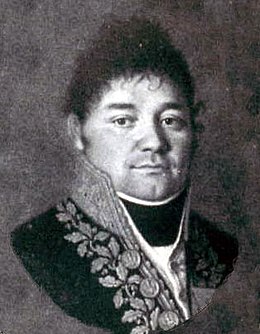| François Roguet | |
|---|---|
 François Roguet François Roguet | |
| Born | 12 November 1770 (1770-11-12) Toulouse, France |
| Died | 4 December 1846 (1846-12-05) (aged 76) Paris, France |
| Allegiance | |
| Service | Infantry |
| Years of service | |
| Rank | General of Division |
| Battles / wars | |
| Awards | Légion d'Honneur, CC 1804 |
| Other work | Count of the Empire, 1814 |
François Roguet (French pronunciation: [fʁɑ̃swa ʁɔɡɛ]; 12 November 1770 – 4 December 1846) became a French division commander in the Imperial Guard during the Napoleonic Wars. He enlisted in the French Royal Army in 1789. His regiment was assigned to the Army of Italy in 1792 and fought in the Italian campaigns of the French Revolutionary Wars. He commanded a battalion at the Battle of Rivoli in 1797. He was badly wounded at the Battle of Verona in 1799. For suppressing partisans he was promoted to command an infantry regiment.
Promoted general of brigade in 1803, Roguet fought at Elchingen and Scharnitz in 1805. He led his brigade at Jena and Magdeburg in 1806 and at Eylau and Guttstadt in 1807. He led a Young Guard brigade at Aspern-Essling and Wagram. He was in Spain in 1808 and 1810–1811. In the latter year he received promotion to general of division. In 1812 he directed the Young Guard at Battle of Krasnoi. In 1813 he led the Old Guard division at Lützen and Bautzen and a Young Guard division at Dresden and Leipzig. In 1814 he led a Young Guard division at Hoogstraten and Courtrai. In 1815 he led Imperial Guard troops at Ligny and Waterloo. After a period of retirement, he led a French division that intervened in the Belgian Revolution. His surname is one of the names inscribed under the Arc de Triomphe, on Column 26.
Career
In September 1800, the 33rd Line Infantry Demi-brigade was inspected in Paris by Napoleon Bonaparte. Only 37 officers and 295 soldiers remained of the unit and many men were barefoot and in ragged uniforms, because their clothing allotment had not been delivered. Napoleon circulated among the soldiers, recognizing veterans and recalling old victories. He ended the review by promoting Roguet the new commander and charging him to rebuild the unit to its former glory. The ranks were soon filled with apprehended draft evaders, recruits rejected by the cavalry and coastal artillery, deserters released from prison, and conscripts from the Eure department.
Notes
- Arnold 2005, pp. 207–208.
References
- APPL (2009). "ROGUET, François Étienne, général comte (1770-1846)". Amis et Passionées du Père-Lachaise. Retrieved 31 December 2017.
- Arnold, James R. (2005). Marengo & Hohenlinden: Napoleon's Rise to Power. Barnsley, South Yorkshire: Pen and Sword. ISBN 1-84415-279-0.
- Broughton, Tony (2003). "The Garde Imperiale and Its Commanders during the Period 1804 – 1815: Francois Roguet". The Napoleon Series. Retrieved 31 December 2017.
- Chandler, David G. (1966). The Campaigns of Napoleon. New York, N.Y.: Macmillan.
- Jensen, Nathan (2014). "General François Roguet". frenchempire.net. Retrieved 31 December 2017.
- Leggiere, Michael V. (2007). The Fall of Napoleon: The Allied Invasion of France. Vol. 1. New York, NY: Cambridge University Press. ISBN 978-0-521-87542-4.
- Leggiere, Michael V. (2015). Napoleon and the Struggle for Germany: The War of Liberation, Spring 1813. Vol. 1. Cambridge, UK: Cambridge University Press. ISBN 978-1-107-08051-5.
- Mullié, Charles (1852). Biographie des célébrités militaires des armées de terre et de mer de 1789 a 1850 (in French). Paris. Retrieved 31 December 2017.
{{cite book}}: CS1 maint: location missing publisher (link) - Nafziger, George (2015). The End of Empire: Napoleon's 1814 Campaign. Solihull, UK: Helion & Company. ISBN 978-1-909982-96-3.
- Nafziger, George (1992). Grande Armée, Battle of Bautzen, 20/21 May 1813 (PDF). Fort Leavenworth, KS: US Army Combined Arms Center. Retrieved 31 December 2017.
- Nafziger, George (1992). Grande Armée, Battle of Gross-Gorschen, 2 May 1813 (PDF). Fort Leavenworth, KS: US Army Combined Arms Center. Retrieved 31 December 2017.
- Nafziger, George (1990). French Army, Battle of Leipzig, 16-19 October 1813 (PDF). Fort Leavenworth, KS: US Army Combined Arms Center. Retrieved 31 December 2017.
- Smith, Digby (1998). The Napoleonic Wars Data Book. London: Greenhill. ISBN 1-85367-276-9.
- 1770 births
- 1846 deaths
- French generals
- French military personnel of the French Revolutionary Wars
- French commanders of the Napoleonic Wars
- Military personnel from Toulouse
- Counts of the First French Empire
- Grand Cross of the Legion of Honour
- Burials at Père Lachaise Cemetery
- Names inscribed under the Arc de Triomphe